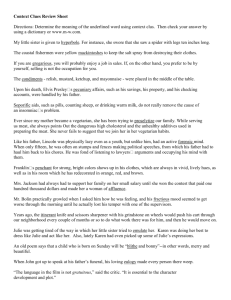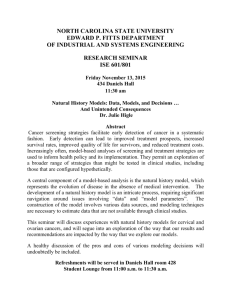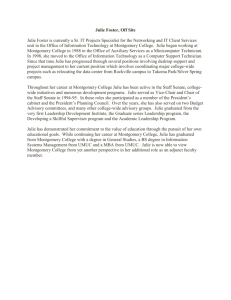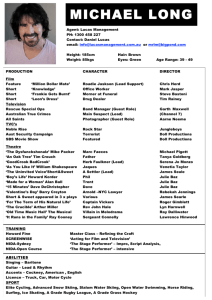Social capital
advertisement
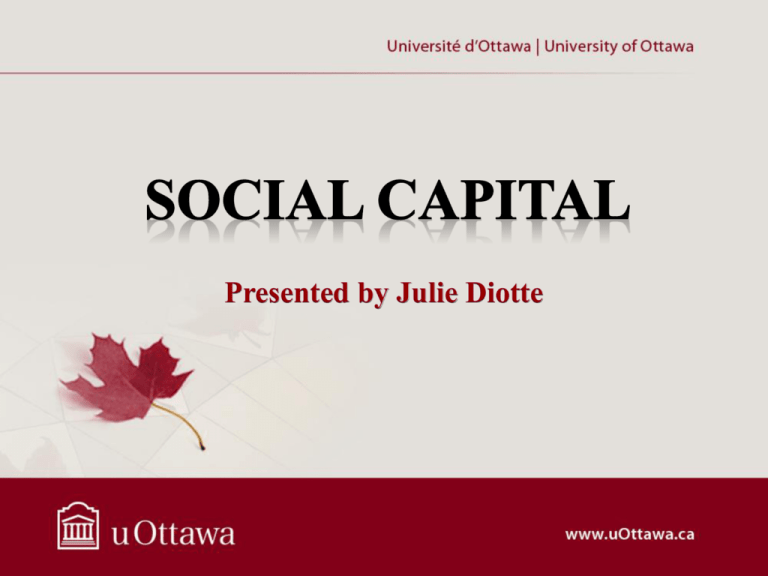
Presented by Julie Diotte Capital • Bourdieu – 3 fundamental types of capital – Economic – Social – Cultural • Marx’s theory (economics) • Impact on an individual’s life EPI6181 – Julie Diotte Capital – 3 fundamental types Economic Capital • Money = power • Basis of social and cultural capitals EPI6181 – Julie Diotte Capital – 3 fundamental types Economic Capital Economic capital Social networks EPI6181 – Julie Diotte Capital – 3 fundamental types Cultural Capital • • • • Education Language Vertical transmission of practices Accumulated knowledge EPI6181 – Julie Diotte Capital – 3 fundamental types Social Capital • Eclectic definition • 3 founding fathers = 3 definitions – Bourdieu, Coleman and Putnam • http://www.youtube.com/watch?v=tTvbf1WVY FE EPI6181 – Julie Diotte Social Capital • Pierre Bourdieu – “Aggregation of the actual or potential resources which are linked to possession of a durable network of more or less institutionalized relationships of mutual acquaintance and recognition” – Group membership, relationships, and networks of influence and support – Individualistic EPI6181 – Julie Diotte Social Capital • Bourdieu – Social capital helps maintain social inequalities within society EPI6181 – Julie Diotte Social Capital • Pierre Bourdieu – Negative effects of social capital as well • Low SES • Crime and violence – Reinforces inequality EPI6181 – Julie Diotte Social Capital • James Coleman – “variety of entities with two elements in common: they all consist of some aspect of social structure, and they facilitate certain actions of actors.. within the structure” – social + economic theory politics EPI6181 – Julie Diotte Social Capital • Robert Putnam – “collective value of all social networks and the inclination that arise from these networks to do things for each other” – form of social relationship, through organization, norms, and trust that promote coordination and cooperation for mutual benefits – Democracy / community EPI6181 – Julie Diotte Analysis • Quantitatively/ qualitatively • Search for words related to SC – Coded then analyzed • Sense of identity, sense of belonging, belief systems and ideologies, family life, groups, networks, trust, solidarity, collection action and cooperation, community, information and communication, social cohesion and inclusion EPI6181 – Julie Diotte Framework model Operationalization of the concept EPI6181 – Julie Diotte Click View then Header and Footer to change this footer Criticisms • Three founding fathers = three definitions – variation • Subjectivity • Difficult to calculate the exact amount of social capital volume for an individual • Limits to access of Bourdieu’s work on social capital EPI6181 – Julie Diotte Strengths • Applied to both qualitative and quantitative research • Methodologies make it easier for the researchers to collect the data • Useful in acknowledgment of social variations and health inequalities in a society • Applied to health and well-being, as SC is a social determinant of health that has an impact on the individual’s life EPI6181 – Julie Diotte Social Capital and health • How can social capital be useful when it comes to health inequalities? – According to the 2003 Health Canada report Social Capital as a Health Determinant. How is it Defined, social capital is now considered as a social determinant of health. – Recent studies have demonstrated the importance of SC and health. EPI6181 – Julie Diotte Social Capital and health • Difficult to separate gender + social capital when it comes to health −Gender role= men tend to have riskier behaviour −Social capital = positive effect on health • Strong social ties, social support and social participation • 1/3 mortality rate EPI6181 – Julie Diotte Social Capital and health • Back to Bourdieu’s equation of practice.. – SES influences capital, field, habitus -> impact on practices • Practices, e.g. sports & PA, leisure and nutrition EPI6181 – Julie Diotte Concluding thoughts • Social capital = resources available to the individual through his/her social network • Very broad concept, used in a variety of disciplines, from economics and politics to health and social inequalities. • Useful to apply to health as it helps understand the social inequalities within and between communities that result in health inequalities. EPI6181 – Julie Diotte EPI6181 – Julie Diotte References • • • • • • • • • • • • • • • Botanski, L (1971). Les usages sociaux du corps. In Annales : Economie, Societe, Civilisation, 26, 205-233. Bourdieu, P. (1984). Distinction : A Social critique of the jugement of taste. (R. Nice, Trans.) Cambridge, MA: Harvard University Press Bourdieu, P. (1986): The Forms of Capital, in: Richardson, J. G. (ed.): Handbook of Theory and Research for the Sociology of Education, New York/Westport/London, pp. 241-258. Coleman, J. (1988). Social Capital in the Creation of Human Capital. The American Journal of Sociology.94, pp. S95-S120. Crossley, N. (2008). Social class. In Grenfell, M. Pierre Bourdieu: Key Concepts. (pp 87-101). Stocksfield: Acumen. Fields, J. (2003). Social capital. (pp.1-146.) London: Routledge Hyyppä, M. (2010). Health Ties. (pp. 1-165). Finland: Springer Netherlands Kawachi, I., Colditz, G., Ascherio, A., Rimm, E., Giovannucci, E., Stampfer, M. & Willett, W. (1996). A prospective study of social networks in relation to total mortality and cardiovasculat disease in men in the USA. In Journal of Epistemology and Community Health, 50, 245-251. Kawachi, I., Kim, D. (2008). Social capital and health. (pp.1-292). New York: Springer. Laberge, S. & Kay, J. (2002). Pierre Bourdieu’s sociological theory and sport practice. In Macguire,J. & Young, K. Theory, Sport & Society. (pp.239-267). Oxford: Elsevier. Moore, R. (2008). Capital. In Grenfell, M. Pierre Bourdieu: Key Concepts, (pp. 101-119). Stocksfield: Acumen. Putnam,R. (1993) The Prosperous Community,” The American Prospect 4(13). (pp.61-72) Swartz, D.L. & Zolberg, V.L. (2005). In memorian: Pierre Bourdieu 1930-2002. In After Bourdieu: Influence, Critique, Elaboration. (pp.17-23). Boston : Kluwer Academics Verbrugge, L.M. (1989). The twain meet: empirical explanations of sex differences in health and mortality. In Journal of Health Social Behaviour, 30, 282-304. World Health Organization (2010) Addressing socioeconomic and gender inequities in the WHO European Region Social and gender inequalities in environment and health. Retrieved from: http://www.euro.who.int/__data/assets/pdf_file/0010/76519/Parma_EH_Conf_pb1.pdf EPI6181 – Julie Diotte
